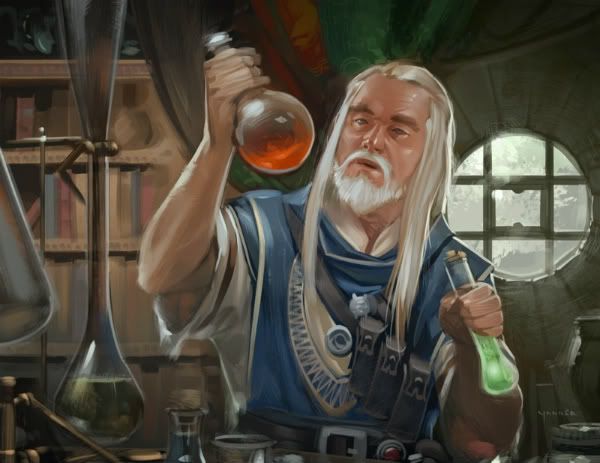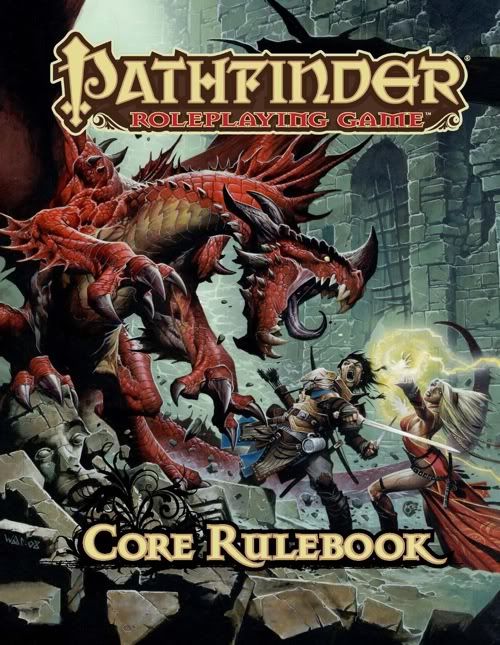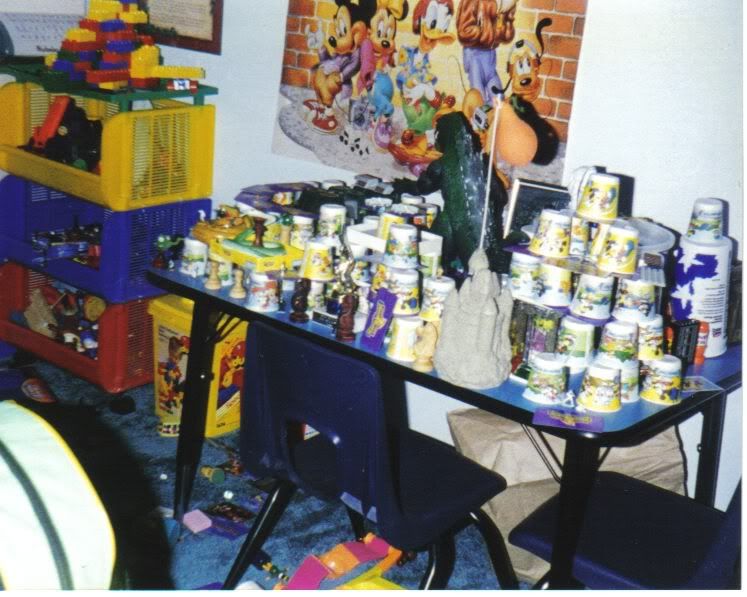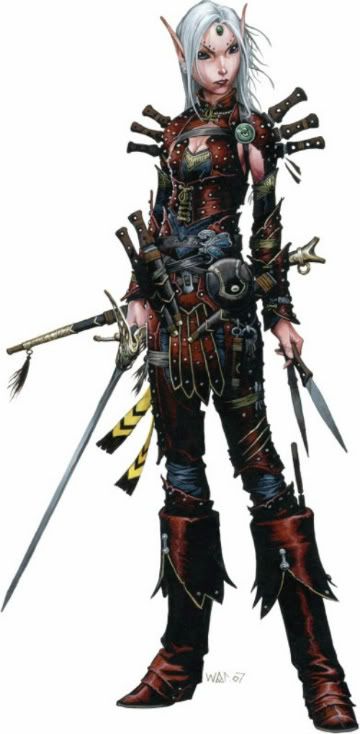 Earlier this week my assessment of the core classes presented in the Pathfinder Core Rulebook ended up running long, so I split it into two parts. The last six classes (From Monks to Wizards) are covered here. If you want to read about any of the other core classes, the previous post is just a click away.
Earlier this week my assessment of the core classes presented in the Pathfinder Core Rulebook ended up running long, so I split it into two parts. The last six classes (From Monks to Wizards) are covered here. If you want to read about any of the other core classes, the previous post is just a click away. Monk
Monks have received a lot of small buffs. Their flurry of blows now starts at -1/-1 and ends with the best attacks at 18/18, whereas in 3.5 it began at -2/-2 and ended at 15/15 for the best attacks. The AC bonus is also slightly improved, ending at +5 instead of +4. Some class abilities, such as fast movement, also come a level earlier than they did in 3.5.
Part of the improvements to monks are the large number of advanced unarmed combat feats. And while these feats are not monk exclusive, they've obviously been designed with monks in mind. Monks even receive a number of these feats for free as bonus feats while they level. As an example, at level 1, Monks get "Stunning Fist" as a bonus feat, which stuns the target for 1 round on a successful attack.
Not surprisingly, Monks also receive a number of bonuses to their Combat Maneuvers. Combat Maneuvers are one of the biggest improvements of pathfinder, replacing a number of more complicated systems in 3.5. Most notably, the justifiably loathed grapple rules.
Paladin
Without question, the largest improvement to the Paladin class is that the class's character portrait no longer looks completely ridiculous. Seriously, compare the two:
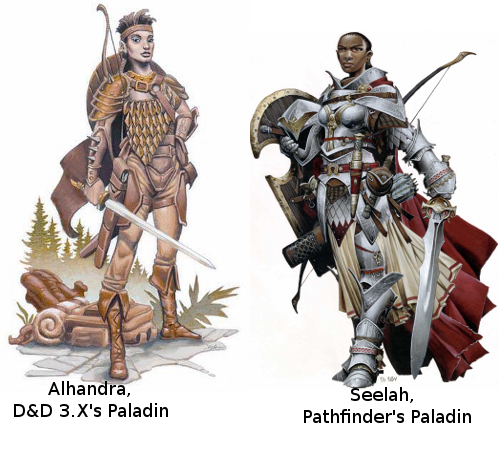
I think there's a reason Alhandra was never included in any other drawings, in any other D&D book that I'm aware of. What the fuck kind of armor is she wearing? It's just hanging there on that piece of twine. And her hair is some kind of throwback to the 1980s. Shallow as it may be, this picture alone turned me off to paladins for a long time. Seelah really makes the class look good.
There's actually a lot to talk about with paladins. In 3.5 they had 8 (out of 20) levels in which they received no class abilities. In Pathfinder, that number has been reduced to 0.
One of the big changes is the new class-defining ability, Mercy. A little bit like the Barbarian's Rage Powers, Mercies are abilities which modify the Paladin's Lay on Hands ability. They are selected from a list every few levels, and the paladin can add all of those effects (every one she has) anytime she lays on hands. Most of the mercies do things like remove fatigue & remove disease (replacing the "Remove Disease" ability which 3.5 paladins eventually got on a weekly basis.)
At the same level a 3.5 paladin received "turn undead," Pathfinder paladins unsurprisingly receive "Channel Positive Energy" as a cleric does.
At 5th level, instead of getting a mount, the Paladin gets "Divine Bond." This is another ability which gives players a choice between the classic 3.5 class skill, and a new ability of similar power. In this case, the choice is between a special mount, and the ability to call the upon the power of your god to empower your weapon--to greater and greater effect the more paladin levels you take.
Perhaps taking a page from Blizzard, Paladins also posses a number of "Auras" now. I won't go into them in detail, but most of them are active simultaneously so long as the Paladin is conscious. As examples, Aura of Resolve grants +4 morale bonuses on saves to the Paladin, and anyone within 10 feet. And Aura of Justice allows the paladin to expend two uses of Smite Evil to instead grant Smite Evil to all allies within 10 ft.
At level 20, the Paladin can actually banish evil outsiders with the user of her smite evil. Which, to me, is a fantastically flavorful ability to give the class. The idea that my Paladin could knock a demon back into hell with her sword is just badass.
Ranger
Rangers received one of my favorite buffs of any of the pathfinder classes: favored terrain.
I'm sure anyone familiar with 3.5, upon hearing the name of the ability, has already figured out what it does, and realized just how much it was needed. But allow me to give the specifics.
At 3rd level, a ranger may select a type of terrain from the Favored Terrains table. The ranger gains a +2 bonus on initiative checks and Knowledge(Geography), Perception, Stealth, and Survival checks when he is in this terrain. A ranger traveling through his favored terrain normally leaves no trail and cannot be tracked (though he may leave a trail if he so chooses.)
At 8th level, and every five levels thereafter, the ranger may select an additional favored terrain. In addition, at each such interval, the skill bonus and initiative bonus in any one favored terrain (including the one just selected, if so desired) increases by +2.
Yes. Yes. Ten thousand times yes. A million times yes. This is perfect for rangers. Thank you, Paizo.
Ranger HD has been increased from 8 to 10, which I fully approve of. If Aragorn was a ranger, they deserve as much HD as a fighter gets for sure.
Rather than an animal companion, players can choose between an animal companion, or the ability to grant half their favored enemy bonus to allies within 30 feet. I do like the idea of Rangers having animal companions, but I like having options, so bravo on this one as well, Paizo.
The "Combat Style" paths available to Rangers in 3.5 (Dual Wielding, or Ranged) has been replaced by "Combat Style Feats." Which is a small list of feats which the ranger can select from every few levels. Again, it would be possible to use this ability to do the same thing 3.5 offered, but you also have the option of doing something a little more personal for your character.
Rangers also have a cool new ability called "Quarry." Essentially, it allows them to designate a target, and essentially swear to kill/capture/something that target. The ranger gains bonuses on tracking their Quarry, attacking their Quarry, and critting against their quarry.
At level 20, Rangers gain the ability to potentially one-shot a favored enemy once per day.
Rogue
Rogues are my favorite class, easily. I don't get to be a player as often as I would like, but I can count the number of times I've played a non-rogue on my fingers. On one of my non-rogue characters, I even had to multiclass into Rogue, because the GM was having trouble designing challenges for me due to the break in pattern.
First change to the class is that it's bumped up from D6 HD to a D8. Woo!
Rogues were already a class which got a new ability at very nearly every level, but Pathfinder has still mixed things up a bit.
The biggest change to the class are Rogue Talents. In 3.5, starting at level 10, and every 3 levels thereafter, the Rogue was able to choose from a list of special abilities which functioned a little bit like rogue-only feats.
In Pathfinder, the Special Abilities have been renamed Rogue Talents, you get your first one at level 2, and you get a new one every 2 levels after that. This is a massive boost for the class.
A few abilities which Rogues used to get as they leveled have been turned into Rogue Talents to balance out this buff. But, as with many other classes, it's not hard to build a rogue based on the 3.5 progression model.
Sorcerer
As I mentioned with the Cleric, Spellcasters were the big problem in 3.5, with regards to class balance. After the first few levels, they simply outpaced the other classes. So for the most part, casters haven't been buffed. Both Sorcerers and Wizards have had their HD increased to D6, and gotten a few more options for themselves. But beyond that, they are largely the same.
Sorcerers have lost the ability to summon familiars. They can, if they like, take a feat which would allow them to regain this talent.
The big change with Sorcerer's is Bloodlines. In the 3.5 fluff for the class, it said "Some sorcerers claim that the blood of dragons courses through their veins."
Paizo apparently thought that was a good idea, because every Sorcerer now selects a "Bloodline." These indicate what kind of crazy creature fucked one of the sorcerer's ancestors, thereby granting them their powers.
The bloodlines are extremely varied, and very cool. Everything from "Aberrant" to "Undead" is represented in the choices, and every one of those comes with a large variety of character options.
To discuss just one of those here, below is some information from the "Elemental" bloodline.
*Knowledge(Planes) is granted as a class spell.
*Bonus spells at odd numbered levels based on whatever type of element the sorcerer is related to.
*Bonus Feats (for scheduled bonus feat levels) include dodge, empower spell, improved initiative, lightning reflexes, and others.
*You can change elemental spells to match your chosen element. (ie. Fireball becomes Iceball)
*Bloodline Powers:
*--Elemental Ray: Starting at first level, you can release an elemental ray as a standard action. Deals 1d6 +1/2lvl damage of your element type.
*--Elemental Resistance: At 3rd level, you gain resist 10 against your energy type. At level 9, it becomes 20.
*--Elemental Blast: At 9th level, you can blast a 20ft radius with your elemental type, dealing 1d6 damage per level.
*--Elemental Movement: At level 15, you gain a type of movement based on your element. Air elementals, for example, get Fly(60)(Average)
*--Elemental Body: Immune to sneak attacks, crits, and any damage from your element type.
Now that I think about it, that's actually a pretty huge buff compared to the 3.5 Sorcerer class. >.>
Wizards
Wizards are exactly the same, except for two small changes.
First, Wizards now get a choice. They can either have a familiar, or if they prefer, they can have a "Bonded Object," such as a staff, talisman, or wand. If the wizard has a bonded object, then they MUST have that object in order to cast any spells. And, once per day, it can be used to cast a spell which the Wizard did not prepare.
The other small difference is school specialization. Wizards can still opt out of specializing in a school if they wish. The 3.5 bonus of specializing is retained, though the 2 sacrificed schools are no longer "banned." They simply cost 2 spell slots to prepare.
Specialists also gain some small bonuses from specializing. Nothing on the level of a Sorcerer's bloodlines. But, for example, an Abjurist gains 5 energy resist against an energy type chosen every morning, which increases to 10 resist at level 11, and a complete immunity at level 20. They can also create a protective shield in a 10 foot radius which lasts a number of rounds equal to their INT modifier, and they also eventually gain energy absorption 3.
And that's it! That's all the Pathfinder classes, and what I think of them when compared to their 3.5 counterparts. The improvements are, almost without exception, huge improvements. I cannot wait to switch over to Pathfinder for the next game I run.
I'll be taking a small break from my Pathfinder: First Thoughts series. Soon, though, I'll move on to the other chapters of the book.
